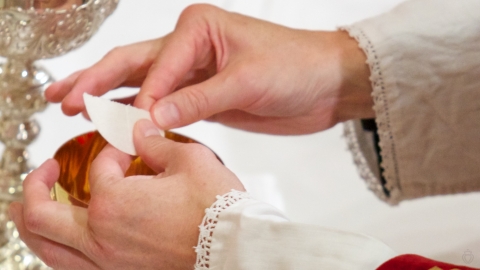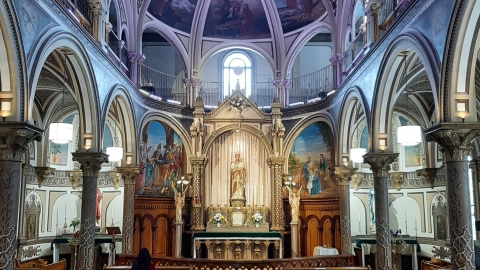The Synod that Will "Save" the Amazon and the Church
The Synod for the Amazon will be held in Rome from October 6-27, 2019. With the theme “The Amazon: New paths for the Church and for an integral ecology,” this synod will bring together in the Vatican more than 200 bishops coming from nine countries (Brazil, Bolivia, Colombia, Ecuador, Guyana, Peru, Surinam, Venezuela, and French Guiana). Desired by Pope Francis, for whom “the Amazon constitutes a decisive test for the Church,” it is taking place a little more than four years after the publication of the encyclical Laudate si’, with the aim of “the protection of the common house.”
But behind these environmental themes are hidden ecclesiological themes, as bluntly declared by the synod leaders, at whose head is the Brazilian Cardinal Claudio Hummes, president of the Pan-Amazonian Ecclesial Network, Red Eclesial Panamazónica or REPAM, and the general relator of the synod. “We have a great need for new paths, to not fear novelty, to not prevent it, to not resist it.” What is clearly meant is that we must consider heretofore unseen solutions to relieve the Church in the Amazon where a cruel lack of priests and religious has been felt, and where each day the faithful join the evangelical sects which are proliferating. Cardinal Hummes words, based on the Instrumentum laboris (the working document for the synod), made public on June 17, 2019, when the bishops were invited to reflect on these “new paths,” to explore, among other things, the priestly ordination “of married men of demonstrated virtue (viri probati).” From that perspective, the synod could propose that “the possibility of priestly ordination be studied for older people, preferably indigenous, respected and accepted by their community, even if they have an existing and stable family, in order to ensure availability of the Sacraments that accompany and sustain the Christian life.”
To the expression “ordination of married men,” Bishop Erwin Kraütler prefers that of “married persons.” The former Bishop of Xingu, in Balem do Para, Brazil, who had been designated by Pope Francis to prepare the synod, affirms without batting an eye that “many married women preside over the indigenous Catholic communities in the diocesan territory. These women are not satisfied with celebrating the Liturgy of the Word on Sundays. They christen also, prepare people for baptism and communion, and visit the sick.” Consequently, asks Bishop Kraütler, “why would it not be possible to ordain these women? And not only in the cases of the lack of priests or the availability of married men to ordain.”
Such are the ecclesiological issues behind the environmental synod: the bishops are called to "save" the Church under the pretext of saving the Amazon…Consequently, one can understand the criticisms brought against the Instrumentum laboris by Cardinals Gerhard Müller, Walter Brandmüller, and Raymond Burke. However, the partisans of the radical reform of the Church pay no attention. Thus Rodrigo Coppe Caldeira, historian and professor of religious science at the University of Belo Horizonte in central Brazil estimates that, “the criticisms pronounced about this synod are in fact a new chapter in the conflict that started with the election of Bergoglio as pope.” According to him, there exists in effect “two currants in conflict, both heirs of the Second Vatican Council.” (He is right on that precise point; that is what weakens the criticisms made against the synod – Editor’s note.) “The first, agreeing with the positions of the Holy Father, believe themselves to be the legitimate heirs of the Council. They look to push the Church in the direction of new perspectives, like the ordination of married men or being open to a female diaconate.” The second currant, on the other hand, “is very reticent about Francis’ pontificacy and perceives the Synod for the Amazon as an attempt to institute profound change in the Church.”
On the political side, the conservative Brazilian delegates, favorable to the government of Jaïr Bolsonaro, have also mobilized against the synod. These elected representatives have decided to organize meeting in Rome on October 4 and 5 to contest the manner in which the Vatican should approach the environmental question. In particular, by throwing out of office the “environmental politicians who would deprive the population of the Amazon region of development.”
This “counter-synod” does not worry the Roman authorities at all. Cardinal Lorenzo Baldisseri, secretary general of the synod, is content to say, “We already know that the synod for the Amazon is going to provoke strong reactions. But the stakes are too important to avoid it.” “The Amazon concerns everyone,” added Cardinal Claudio Hummes in Avvenir, outside a meeting held March 19-21 at Georgetown University in Washington, D.C. “That is where the future of the planet and of humanity is at stake. Because without the Amazon, the world will not survive,” he added. –It is no longer the case of only saving the Amazon and the Church, but the planet and humanity as well! By taking advantage of it so as to ordain married men and women…
The Progressives Get Ready
From August 28-31, a meeting in preparation for the upcoming Synod for the Amazon was held in the convent in Belam in Para, Brazil. Nearly sixty Brazilian bishops and as many priests, religious, and laity, met to study one last time Instrumentum laboris which will serve as the basis of the reflection during the meeting of the prelates in Rome.
“We defend the Amazon in an uncompromising way," hammered the bishops at the end of this meeting. "We demand that governments take urgent measures against the violent and irrational aggression of nature, the unscrupulous destruction of the forest that kills the thousand-year-old flora and fauna, through fires caused by criminal behavior.” And to conclude: “We, bishops of the Amazon, consider that this synod comes at a crucial moment in our history.”
As a background of these rhetorical incantations, it is necessary to read the document titled, “Towards the Pan-Amazonian Synod: Challenges and Contributions from Latin America and the Caribbean” written in April of this year as a result of a meeting in Bogota, Colombia, by 28 theologians from two organizations promoting liberation theology: “Amerindia,” and “REPAM.”
This document was disseminated through the website LifeSiteNews on September 3rd. “It is not fair that we think and say that only one species should prevail, but on the contrary; all species have value and together they reveal the virtues of the mystery of life. Similarly, it is not fair to say that only one religion is true and the others are decadent, for they all reveal the mystery of God and reveal the many ways in which we walk in fidelity and love for God” (p. 86).
The document also claims that the Catholic Church must move “from intolerant exclusivism to an attitude of respect that accepts that Christianity does not have a historical monopoly on salvation” (p. 84), and that “pluralism and diversity of religions are expressions of a wise divine will” (p. 53), referring back to the expression by Pope Francis and the grand imam Al’Azhar in their Document on Human Fraternity for World Peace and Living Together of February 4, 2019.
According to this document, a “Church incarnated in the Amazon” involves the power of “ensuring the celebration of the Sunday Eucharist in ecclesial communities by the ordination of married priests…Welcoming and supporting…feminist and ecological theology as a support for the configuration of a Church with its own face…Discerning the opportunity for the ordination of women to the diaconate, as well as the creation of other ministries of one's own, according to the needs of the local Church” (p. 81).
Regarding the Catholic dogma on the priesthood, which is exclusively masculine, the Bogota document considers it as “a modifiable ‘position’ that theologians should be able to ‘reflect on’ to discern the ‘signs of the times.’” Here is what was written by 28 progressive theologians: “We are fully aware of the Catholic Church’s position on this issue. We recommend, however, that theologians, respecting in a reverent way the data of faith and in profound communion with the Magisterium, may continue with complete freedom the reflection on the priestly ordination of women, enriching their analysis with resources coming from psychology, sociology, anthropology, history, philosophy and hermeneutics, in order to be able to discern the presence of the Spirit in that sign of the times which is, according to John XXIII, the presence of women in public life” (p. 105).
In addition, “the document calls for ‘understanding and recognizing once again the virtues, knowledge and cosmovisions existing among the ancestral ethnic groups, which still retain the ability to read and conceive nature as the true mother’” (p. 34).
In the document, “God is referred to as the masculine-feminine ‘Creator-Creatora,’” and it is stated that the Amazonians “have their sacred histories, languages, knowledge, traditions, spiritualities and theologies. All of them seek to build a ‘good life’ and the communion of people among themselves, with the world, with living beings and with the Creator-Creatora. They feel that they are living well in the ‘house’ that the Creator-Creatora gave them on Earth” (p. 54). And “the document closes with a prayer to the ‘Father and Mother of life’” (p. 129).
Who Authored the Document?
The Bogata document is not the wild imaginings of some liberation theologians, meeting in private. The Roman Instrumentum laboris mentions their meeting as one of the preparatory works for the synod, indicating in its Note 1: “In addition to this official process, numerous seminars have been held in Washington D.C., Rome, and Bogotá, with experts in different areas and representatives of Amazon peoples, to reflect on the issues analyzed here.”
Further, “four people involved in the work of the pre-synodal council (as members or experts) convened by Pope Francis in March of 2018 were present at the meeting in Bogota: Fr. Paolo Suess (close collaborator of Bishop Kraütler, bishop member of the pre-synodal council, already quoted)—Fr. Suess participated as an expert (peritus) to the pre-synodal council; Maruicio Lopez (executive secretary of REPAM and member of the council), Fr. Justino Sarmento Rezende, priest and indigenous expert, and finally, Fr. Peter Hughes (also an expert). These four people have been, according to a Spanish source, the principal authors of the preparatory document for the synod on the Amazon in 2018. It is generally thought that Fr. Suess played a leading role in Instrumentum laboris of 2019.”
The two organizations behind the Bogata meeting are activists in liberation theology, under the cover of environmentalism. Amerindia is a organization of progressive theologians who, since 1978, have had an influence on the South American prelates, especially during episcopal meetings of the Latin-American Episcopal Council (CELAM), such as the one at Aparecida in May 2007 where the writing of the final document was directed by Cardinal Jorge Bergoglio, then Archbishop of Buenos Aires.
Amerindia promoted the thesis of Leonard Boff, one of the partisans of liberation theology, for which he was condemned in the middle of the 1980s. He has since left the priesthood and is married. Last July, he posted on his blog, hosted by Amerindia, an article in favor of the ordination of women. REPAM is a coalition of organizations at the service of Pope Francis’ environmental program, founded in 2014, seemingly at the request of Francis himself. One of its member, Caritas Internationalis, said of the organization that “it is a project of the nine Churches of the Amazon region, inspired by Pope Francis and backed by the Latin American Bishops’ Conference, CELAM.”
LifeSiteNews, who revealed the Bogota document, contacted Amerindia to ask for the names of the authors of this publication. Oscar Elizalde Prada, director of communications and one of the participants in the April meeting, “declined to give…information as to who wrote which of the chapters of the Bogota document, explaining that ‘likewise, as is proper to the communitarian and collaborative spirit of our work in Latin America, it is not possible to attribute the authorship of the content of each chapter of the subsidy that we have published to a specific author or authors. In this we have followed the inspiration of the indigenous peoples, more concerned with the care of the common house than with their protagonists, opting also to make a synodal journey, in dialogue and listening to the cries that spring from the Church in the Amazon and the 'groan of sister Earth', as the Holy Father refers in Laudato si’ (LS 53).”
In this context, one would not be surprised to learn of the presence in Rome of the Peruvian Gustavo Gutierrez, one of the founders of liberation theology, just before the opening of the synod. In fact, he will be the central figure of a meeting organized by the Pontifical Commission for Latin America to commemorate the fortieth anniversary of the Puebla Conference in Mexico. This congress will take place in Rome, at the General Curia of the Society of Jesus, from October 2-4, according to the Spanish news agency Religion Digital.
Editor's Note: We remember that the Puebla Conference, the 3rd general conference of the Latin American episcopate, held in 1979 in the presence of John Paul II, which presented a final document which was, in fact, a tame version of liberation theology.
Related links
- Synode sur l’Amazonie : l'inquiétant document préparatoire
- Document de travail du synode sur l'Amazonie : sous le feu des critiques (2)
- Document de travail du synode sur l'Amazonie : sous le feu des critiques (3)
- Rome soutient opiniâtrement le document du synode sur l'Amazonie
- Document de travail du synode sur l'Amazonie : sous le feu des critiques (1)
- Le cardinal Brandmüller rejette le document préparatoire du Synode sur l’Amazon…
- En attendant le synode sur l’Amazonie : l’encyclique Laudato si’ (1)
- Synode d’Amazonie : le cardinal Kasper rabaisse le célibat sacerdotal
(Sources : DICI/cath.ch/LifeSiteNews – trad. française à partir de jeannesmits – FSSPX.Actualités - 23/09/2019)



